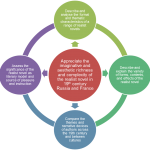
The learning outcomes teachers should set for themselves
At the end of this module, I will know more about: the learning strategies my students use in this module; why they choose these strategies; how my students approach particular activities, such as reading set texts. All of my previous posts, and all of the work undertaken in the ‘Learning Outcomes Project’ so far, […]

Unravelling the assumptions in learning outcomes
In a previous post I described a specific study that we are currently undertaking in the ‘Learning Outcomes Project’ that aims to explore frameworks regarding how student involvement in developing learning outcomes (LOs) could occur and what type(s) of LOs support collaborative student/tutor development (e.g. content-based ones, broader ones, those that are more specific or tightly […]

Students developing their own learning outcomes
In a recent post I questioned how we might frame the concept of learning outcomes (LOs) from the students’ perspective. I was interested particularly in developing a student-focused definition of LOs that goes beyond LOs simply as statements of what a student will know, understand or be able to do at the end of a learning period. […]

The ‘Learning Outcomes Project’: update on activities
In a previous blog post I discussed my disconnection from the idea that learning outcomes (LOs) are ‘student-centred’ because, predominantly in current practice, students play no role in actually developing them. I argued instead that LOs should be collaboratively devised by lecturers and their students to ensure that the outcomes become ‘the property’ of the learner. […]

Writing ‘learning outcomes’ is only the first step: points to consider in how teachers and students work with them
Over the last year or so I have input various times into teaching and learning development sessions run by the institution for new and existing members of staff. My contribution has always been sought when the topic under discussion is ‘learning outcomes’ (LOs). Often these sessions, particularly for new lecturers, focus on why LOs are […]

Getting creative: meaningful visual representations of learning outcomes
I recently came across a couple of sources that focus on identifying ways to present learning objectives to students other than as standard bullet point lists: Different ways to present learning objectives in e-learning 51 ways to introduce learning objectives Whilst these sources may be focused more on learning objectives at the compulsory schooling levels, there […]

Useful Bloom taxonomy related websites/resources (and some critiques)
The taxonomy developed by Bloom, and later revised by Anderson and Krathwohl, usually appears to go hand in hand with the topic of learning outcomes. Most guidance concerning the writing of learning outcomes will advise using this taxonomy and it’s associated active verbs, e.g.: – Setting learning outcomes – Tips on writing learning outcomes – […]

Making learning outcomes really student-centred
I questioned in a previous blog post whether learning outcomes are really deserving of their ‘student-centred’ claim if they are primarily derived by teachers/lecturers and if we have no real idea about how students are actually using them. The ‘Learning Outcomes Project’ team has recently had a paper published in which we begin to address the […]

Beyond Bloom: other useful taxonomies for learning outcomes
In my last post, I suggested that the learning outcomes (LOs) discourse is becoming narrowed around prescribed elements, such as that they must be measurable. Another of these elements has never, I don’t think, been officially prescribed. Yet it has become such an ingrained feature that any discussion of writing or implementing LOs inevitably falls […]

Who are learning outcomes REALLY for?
Some people, who see learning outcomes more as accountability tools, may shout ‘MANAGERS’. Others, who espouse the student-centred notions of learning outcomes, will most probably shout ‘STUDENTS’. The literature would certainly suggest that these are the two main audiences for learning outcomes. But, if we take the most educationally ideal answer, i.e. ‘students’, are […]

Recent Comments